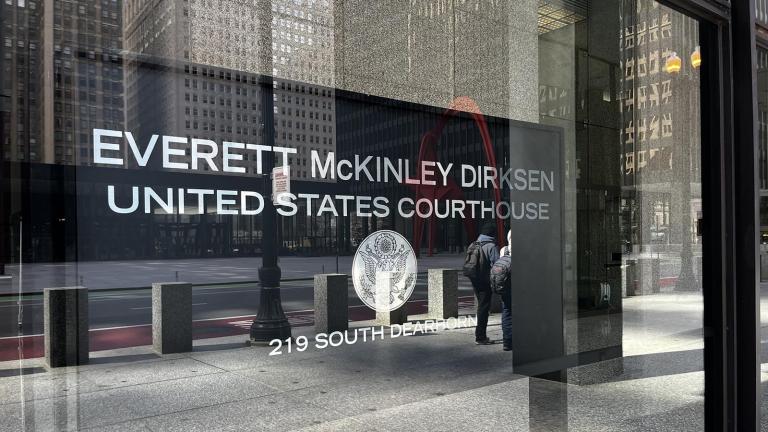Video: Joining “Chicago Tonight” to discuss a judge’s ruling on the SAFE-T Act are Illinois Attorney General Kwame Raoul and Jackson County State's Attorney Joseph Cervantez. (Produced by Jennifer Cotto)
Plans from Illinois legislators to eliminate cash bail statewide have been potentially put on hold after a Kankakee County judge ruled that portion of the SAFE-T Act is unconstitutional.
Circuit Judge Thomas Cunnington late Wednesday issued his ruling after dozens of state’s attorneys sued to prevent Illinois from eliminating cash bail beginning Jan. 1. Cunnington found the pretrial provisions of the SAFE-T Act violate the separation of powers principle and will not take effect in the 65 counties that had sued the state.
In his ruling, Cunnington wrote that if the state legislature had wanted to change provisions regarding eliminating monetary bail, “they should have submitted the question on the ballot to the electorate at a general election.”
Read More: Cash Bail Is Ending (Or Partially Staying?) in Illinois. Here’s What You Need to Know
Both opponents and supporters of the move to eliminate pretrial cash bail were quick to react to the late night ruling.
“(The SAFE-T Act) amended the State Constitution and eroded the constitutional protections of the Victim Rights Act, all while disenfranchising the people of their Constitutional right to vote on such reforms,” Kankakee County State’s Attorney Jim Rowe said in a statement. “The people of Illinois deserve better than that, and today’s verdict condemns the Act for exactly what it is: unconstitutional.”
Illinois Attorney General Kwame Raoul said in a statement that the opinion “does not disturb other portions of the SAFE-T Act that have been in effect for more than a year.”
Raoul said he and Gov. J.B. Pritzker intend to appeal the circuit court’s decision directly to the Illinois Supreme Court. It is not yet clear when that appeal would be heard.
“We don't think that this infringes on the inherent judicial power, in fact the legislature is given power to regulate how judges, for instance, sentence,” Raoul said in an interview with WTTW News on Thursday. “There are mandatory minimums and mandatory maximums and so there are areas of overlapping authority and pretrial detention is one of them.”
Raoul noted the judge’s decision is binding in the 65 counties where suits were filed, it’s not binding in any other case, “including those involving criminal defendants in any of the state’s 102 counties,” he said in a statement.
Cook County court officials on Thursday issued a joint statement in which they say they will be “proceeding with full implementation of the SAFE-T Act on January 1, 2023 as planned.”
“The SAFE-T Act and the Pretrial Fairness Act were thoughtfully drafted to prioritize safety for victims, accused people and entire communities,” the statement, which was signed by the offices of the Cook County president, public defender, state’s attorney, circuit court clerk and justice advisory council, said. “We look forward to the Illinois Supreme Court’s review and clarification regarding the constitutionality of these laws. Until then, we stand firm in our commitment to the smooth and successful implementation of the SAFE-T Act in its entirety. We look forward to welcoming in this historic reform for Cook County in the new year and are confident the rest of the state will join us soon.”
Under the current system, when someone is arrested for a crime, they appear before a judge who decides whether that person must remain incarcerated or whether they can be released from jail while awaiting trial.
If a judge determines someone does pose a significant risk, they can be ordered to remain in jail until their trial. But other defendants can be issued a cash bond, which they must put up a certain amount of to secure their release from jail.
Under the SAFE-T Act, that would no longer be the case.
People arrested for certain crimes — including first- and second-degree murder, predatory criminal sexual assault of a child, aggravated criminal sexual assault and criminal sexual assault, robbery and burglary “where this is use of force against another person,” residential burglary, home invasion and vehicular invasion — could still be denied pretrial release.
But in other cases, if a judge decides a defendant does not pose a public safety or flight risk, then they would be released without being required to post any money.
Benjamin Ruddell, director of criminal justice reform at the ACLU of Illinois, said despite the judge’s ruling, the cash bail system in Illinois’ most populous counties will still end on Jan. 1.
“While we disagree with the court’s findings on the money bond issue, it is heartening to see that the court swept aside a series of process arguments that largely ignored the years of work that went into drafting, debating and adopting the SAFE-T Act,” Ruddell said in a statement.
While Raoul said he plans to appeal as soon as possible, he added that it's difficult to predict the timing of when that appeal could be resolved.
Pritzker called the judge’s ruling a “setback for the principles we fought to protect through the passage of the SAFE-T Act.”
“We cannot and should not defend a system that fails to keep people safe by allowing those who are a threat to their community the ability to simply buy their way out of jail,” he said in a statement. “I thank the Attorney General for his work on this case and look forward to the Illinois Supreme Court taking up the appeal as soon as possible.”
Contact Matt Masterson: @ByMattMasterson | [email protected] | (773) 509-5431








